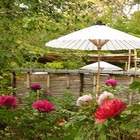In 1998, when I was five years old, my parents took me to Japan. Until then, my father worked at a pharmacy and my mother worked at a supermarket. However, we were barely making ends meet, so we decided to go to Japan to earn money and live a more stable life.
At first, they both worked in the same factory, but my father, who was of Japanese descent and could speak Japanese, was transferred to the main office, and soon after, my mother left the factory to work in a store that sold Brazilian products.
I was in Japan from kindergarten until I graduated from junior high school. Looking back, it was the most fun time of my life. Thanks to my teachers and classmates, I learned to speak Japanese and used it at home. It was me, not my father, who taught Japanese to my Spanish mother! Unlike me, my younger brother cannot speak Japanese even though he was born in Japan.
Because my younger brother was unable to adjust to school in Japan, and also because of the effects of the Lehman Shock, my parents decided that it would be best for us to live in Brazil, so we returned to Brazil in 2008.
I started a new life in Campinas, São Paulo, where my mother's family lives. My father, who inherited his grandfather's business aptitude, opened a large store called "Super Shimada." I still don't know if the "Super" in "Super Shimada" comes from "supermarket" or "Superman Shimada."
The business gradually grew in scale, and five years later, a Japanese restaurant was set up inside the store, where my mother served many of the home-cooked dishes she had learned in Japan. As my mother's name was Camilla, she created dishes such as "Catchan's Croquettes," "Catchan's Tempura," and "Catchan's Curry." Customers called her "Catchan," and she was very enthusiastic.
I graduated from the State University of Campinas and now work in computer engineering.
The younger brother is now 20 years old, helps with the store's accounting, is studying business management, and is a member of an amateur soccer team.
"Super Shimada" opened its second store and is prospering thanks to the support. On weekends, my father goes fishing with his friends and comes home on Sunday afternoon. It has become a daily routine and he is very satisfied with his daily life.
Three years ago, I happened to meet Anelisa, who was my junior high school classmate in Japan, in the U.S. Since then, we have been exchanging e-mails and are now discussing marriage.
As we end our story here, you may be thinking what an ideal life, a dream life for a family.
However, the reality is different. There is no happy ending yet.
It was exactly one year ago that we heard on the news that the first death from COVID-19 had occurred in Brazil. We took thorough measures to prevent infection and were able to safely get through the year.
However, as 2021 began, the COVID-19 pandemic swept in and spread like a raging wave, and even in the areas I knew, tragic events began to occur one after another. Elderly relatives and acquaintances became infected, and some, unfortunately, even died. My university professor passed away at the young age of 51. A friend in São Paulo lost both his parents and grandfather.
My parents are turning 60 soon, so they tell me to try not to go out as much as possible, but it's a problem because my father is the type of person who isn't satisfied unless he gets up and goes out at a usual time.
My mother started a delivary business by making bento lunches and Brazilian home cooking at home. I worked remotely and helped out at the store to ease my father's burden.
But last month, my mother felt unwell and after a test, she was found to have coronavirus. The rest of the family was also tested, and my father and brother, who tested positive, were hospitalized for 41 days. My mother's condition worsened and, much to my regret, she passed away just hours before she could be transferred to a larger hospital. I informed my father and brother of the situation after she was discharged from the hospital.
Since then, my younger brother has been staying at home and crying every day, repeating, "My mother died because of me." In fact, at the end of January, my younger brother attended a party at a friend's apartment without telling us. Meanwhile, my father sits in the chair my mother always used, drinking alcohol and lamenting, "I went fishing and brought the coronavirus home."
I'm very sad, but I don't want to think that it's someone else's fault. The words of the Bible that Anelisa sent me are encouraging.
"To every thing there is a season, and a time to every purpose under the heaven : A time to be born, and a time to die; A time to plant, and a time to pluck up that which is planted; A time to kill , and a time to heal; A time to tear down, and a time to build; A time to weep, and a time to laugh, A time to mourn, and a time to dance" (Ecclesiastes 3:1-4)
From now on, I will continue to work remotely, patiently wait for my family to recover, and manage the business of the store and the health of my employees. I will do my best to do what I can now.
We won't let Corona defeat us!
© 2021 Laura Honda-Hasegawa




